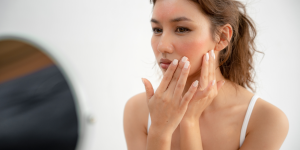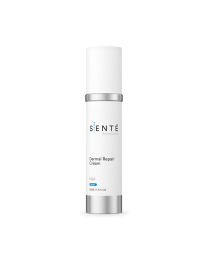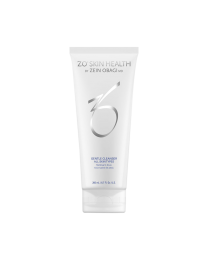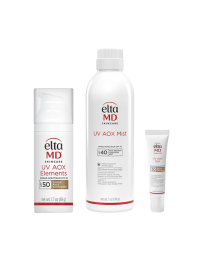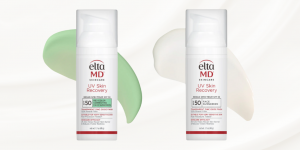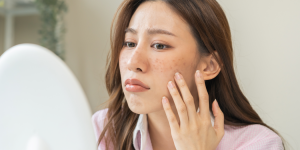Free Shipping Over $100
Free Samples With Every Purchase
Auto Replenishment Available
Authorized Reseller
Use This, Not That: The Best Skincare Products for Sensitive Skin
 Sensitive skin is more common than you might think. Skin sensitivity affects millions of people. If you often experience redness, irritation, or dryness after using skincare products or exposing skin environmental aggressors, you likely have sensitive skin. Caring for it requires a tailored approach to avoid triggers that lead to skin reactions and create a healthy, resilient skin barrier. In this blog, we’ll navigate which skincare ingredients to avoid if you have sensitive skin and what to use instead, along with dermatologist-recommended skincare products for sensitive skin from DermSkincare.
Sensitive skin is more common than you might think. Skin sensitivity affects millions of people. If you often experience redness, irritation, or dryness after using skincare products or exposing skin environmental aggressors, you likely have sensitive skin. Caring for it requires a tailored approach to avoid triggers that lead to skin reactions and create a healthy, resilient skin barrier. In this blog, we’ll navigate which skincare ingredients to avoid if you have sensitive skin and what to use instead, along with dermatologist-recommended skincare products for sensitive skin from DermSkincare.
What Is Sensitive Skin?
Sensitive skin is characterized by heightened reactivity to external factors, including skincare products, environmental stressors, and weather changes. Those who have sensitive skin may notice that their skin is more easily irritated or inflamed, especially when exposed to new agents. Others may have more severe reactions when exposed to environmental aggressors. For instance, exposure to known allergens like poison ivy, oak, and sumac can lead to more severe or prolonged symptoms for people with sensitive skin.
Common Symptoms of Skin Sensitivity
People are often surprised to hear how varied the symptoms of skin sensitivity truly are. Some people experience changes in coloring, others develop itchy skin or rashes, and still others notice dryness or flaking skin. There is a wide range of sensitive skin reactivity, so if you notice irregular skin reactions to products and environmental exposure, it may be time to chat with your dermatologist. Some of the most common symptoms of skin sensitivity include:
- • Redness and discoloration
- • Stinging or burning sensations
- • Dryness and flakiness
- • Increased susceptibility to breakouts
- • Rashes, itching, or hives
Common Causes of Skin Sensitivity
There is not one cause of skin sensitivity. However, there are several factors that increase risk for skin sensitivity, including:
- • Genetics – some people naturally develop thinner or more reactive skin due to the inheritance of specific genes.
- • Harsh skincare products – using strong exfoliants, alcohol-based toners, or potent active ingredients can damage the skin barrier and cause increased sensitivity.
- • Environmental factors – pollution, temperature changes, high humidity, altitude, and sun exposure may worsen skin sensitivity.
Skincare Ingredients & Products to Avoid
To maintain a healthy skin barrier, it’s essential to steer clear of harsh ingredients that may lead to irritation and sensitivity and replace them with gentle, calming skincare products. Below, we outline some of the skincare products to avoid and what to use for sensitive skin:
Harsh Exfoliants & Scrubs
Avoid: Physical exfoliants, high concentrations of AHAs (alpha hydroxy acids), and BHA (beta hydroxy acid like salicylic acid). These can strip the skin’s protective barrier and cause irritation.
Use Instead: Gentle exfoliating serums like skinbetter Science AlphaRet Overnight Cream. This retinoid-AHA blend includes hydrating ingredients to deliver a moisture boost and antioxidant benefits while minimizing irritation. Shop Here
Alcohol-Based Products
Avoid: Toners and cleansers with denatured alcohol, ethanol, or isopropyl alcohol. These ingredients cause dryness and further disrupt the skin barrier for those with sensitive skin.
Use Instead: Hydrating cleansers like ZO Skin Health Gentle Cleanser, which is infused with glycerin, sodium lauroyl oat amino acids, and botanical extracts known for their anti-irritant properties. Shop Here
Fragrance & Essential Oils
Avoid: Strongly scented skincare products and essential oils like peppermint or citrus. Fragrances can trigger allergic reactions and irritation in sensitive skin.
Use Instead: Fragrance-free formulas like Sente Dermal Repair Cream, which hydrates, nourishes, and reduces skin redness while being safe for sensitive and rosacea-prone skin. Shop Here
Strong Active Ingredients
Avoid: High-dose retinol, glycolic acid, and benzoyl peroxide. These ingredients can cause over-exfoliation, leading to damaged skin barrier, irritation, and increased sensitivity.
Use Instead: SkinCeuticals Triple Lipid Restore 2:4:2, an anti-aging moisturizer that mimics the skin’s natural barrier with ceramides, cholesterol, and fatty acids to nourish and correct signs of aging. Shop Here
Skincare Ingredients & Products to Use for Sensitive Skin
The key to managing sensitive skin is using ingredients that hydrate, soothe, and support the skin barrier. Even if you utilize products that are more irritating, soothing ingredients reduce the reactivity of sensitive skin. Some of the most often recommended hydrating and soothing ingredients include:
- • Hyaluronic acid and glycerin – deeply hydrate, and they smooth and plump skin by attracting water to skin cells.
- • Niacinamide – reduces redness and strengthens the skin barrier, helping to prevent irritating ingredients from penetrating below skin’s protective outer barrier and causing skin sensitivity.
- • Ceramides and fatty acids – help restore the skin’s natural moisture balance for short and long-term skin hydration.
Dermatologist-Recommended Soothing Skincare Products for Sensitive Skin
If you’re looking for a soothing, calming, hydrating skincare product, consider adding some of the following products to develop the best sensitive skincare routine:
Cleansers
ZO Skin Health Gentle Cleanser – the non-irritating, fragrance-free cleanser is ideal for those with sensitive skin. It allows for complete cleansing without drying skin or introducing irritating ingredients like fragrances and dyes.
Hydrating Serum
PCA Hyaluronic Acid Boosting Serum – deeply hydrates while strengthening the skin barrier. This synergistic combination of multiple hyaluronic acid formulations increases hydration in the short and long-term. You can apply this serum twice a day following cleansing and before moisturizers and sun protection.
Moisturizers
EltaMD PM Therapy Moisturizer – the right moisture can completely transform sensitive skin. EltaMD PM Therapy Moisturizer promotes hydration and repair overnight, soothing skin from the day’s stressors.
SkinCeuticals Triple Lipid Restore 2:4:2 – replenishes skin with ceramides and essential lipids that soothe skin, hydrate, and strengthen the skin’s protective barrier.
SPF Protection
EltaMD Sunscreen Collection – medical-grade sun protection for sensitive skin. Chemical sunscreens can be one of the top offenders in causing skin irritation. EltaMD’s line of physical sun protection products are dermatologist recommendation to protect skin without causing irritation.
Tips for Building a Sensitive Skin Routine
When creating the perfect skincare routine for sensitive skin, it’s important to choose simple products and remove any unnecessary steps. In short, keep it simple. Some additional tips for building a sensitive skin routine include:
- Test new products gradually – always patch-test before full application. This minimizes the potentially adverse effects of new products.
- Start slow with active ingredients – introduce retinoids and acids once a week before increasing usage. These products are often well tolerated, but for people with sensitive skin, less is more. Apply products once a week and increase gradually as tolerated.
- Hydrate – moisturize daily to soothe and hydrate sensitive skin.
- Protect – reduce sun exposure and apply sunscreen daily to decrease sensitivity caused by sun exposure.
Develop a Skincare Routine to Soothe Sensitive Skin
Finding the right products for sensitive skin is essential to maintaining a healthy skin barrier and preventing irritation. Stick to gentle, fragrance-free, and dermatologist-approved products for the best results. When in doubt, consult with your dermatologist for personalized skincare recommendations.
Explore Dermatologist-Recommended Products for Sensitive Skin
Not sure where to start? Explore our dermatologist-recommended products for sensitive skin on DermSkincare. The skincare products on our site were meticulously curated by board-certified dermatologists. They deliver exceptional results for a range of skin health needs. You can learn more about skincare and find your next perfect product by reading our blog.

